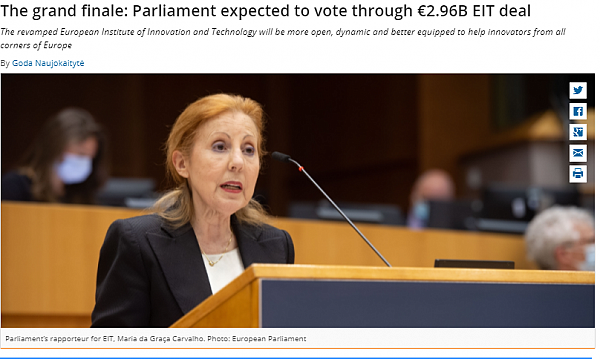Imprensa The grand finale: Parliament expected to vote through €2.96B EIT deal
In the final step required to get the new look European Institute of Innovation and Technology (EIT) off the ground, the European Parliament is expected to vote through its new regulation and strategic agenda today.
“After six months of collective work, we can state we are going to improve research and innovation in Europe,” said the Parliament’s rapporteur for EIT, Maria da Graça Carvalho. “The EIT will be more dynamic, simplified, open and transparent.”
The European Commission first published its proposal for EIT’s reform and strategy for the next seven years in 2018, with the Parliament and the Council, reaching the final agreement on the details in January. The EIT will have funding of €2.96 billion over the next seven years.
Carvalho said the European Parliament achieved all its priorities in the negotiations. EIT is now better equipped to respond to crises, including the COVID-19 pandemic, has a stronger regional dimension and can work with other funding programmes, such as EU regional funds.
MEPs are particularly happy at having sharpened the focus on regional innovation, pushing more EIT activity to less innovative EU countries. The regional innovation scheme, providing extra funding for member states that have fewer members involved in EIT Knowledge and Innovation Communities (KICs), will now have a set budget, spending 10 to 15% of EIT funding on widening geographical participation and fostering innovation hubs.
“I am especially happy that we agreed on a higher budget for the regional innovation scheme,” said centre-right Lithuanian MEP Andrius Kubilius. “Innovation hubs, from my point of view, are the most important elements of the national innovation architecture.”
Other MEPs from around central and eastern Europe echoed this. “We do not want Europe of two speeds,” said centre-right Polish MEP Jerzy Buzek. “The EIT is a great tool here.”
But the praise was not limited to those who hope to be on the receiving end of the regional top-ups. “We have worked very hard to increase geographical involvement and the participation of different regions and countries,” said Spanish MEP Lina Gálvez Muñoz, who spoke on behalf of EIT rapporteur, Marisa Matias. “With [EIT], we want to bridge the gap so we can make the most of our knowledge in Europe.”
The challenges
EIT will now set up two new KICs, whilst continuing the activities of eight existing networks in fields including climate change, manufacturing and health. The new KICs will start work in the cultural and creative sectors in 2022, and water, marine and maritime sectors in 2026.
Agreement on the two new KICs was the thorniest part of the negotiations for MEPs. “Our fight from the Parliament was to start them as early as possible. The Commission and Council wanted to push it for later,” Carvalho told Science|Business.
The Commission and some member states also were not convinced of the need for a KIC on water, but the Parliament persevered. Carvalho said the Portuguese presidency that represented member states in the final round of negotiations between the institutions was instrumental in delivering this KIC.
However, the Parliament struggled to defend the budget. Negotiated as part of the overall €95.5 billion Horizon Europe research budget, EIT’s share was cut by the member states, alongside the rest of research funding. Eventually, the Parliament managed to reclaim a €279 million top up from a €4 billion pot of antitrust fines, to reach the total of €2.96 billion for the next seven years.
Some MEPs are not convinced the budget is high enough to support EIT’s agenda. “We support everything, but we hope we don’t regret not being courageous enough,” said MEP Elena Lizzi from the right-wing populist Identity and Democracy group.
EIT’s future is now lies with the KICs delivering on its priorities. If they do well, their budgets will keep rising over the next seven-years. If not, the money will be diverted elsewhere.
EU research commissioner Mariya Gabriel told the Parliament that KICs will deliver. “I, like you, firmly believe that the EIT is the right tool that our innovators need,” she said.
Carvalho said KICs should choose their partners wisely. In each, there should be a mix of new partners with fresh ideas from all around Europe and older ones that know the EIT system. “We are making the EIT more open, more transparent, but the partners need to know how to apply,” she said. “Prepare well, pay a lot of attention and choose well-balanced partners.”
EIT has already embarked on its mission. In the past month, the agency launched its first Horizon Europe and started preparations for the new KIC for the creative and cultural sectors. The final vote means the money can now start flowing.
